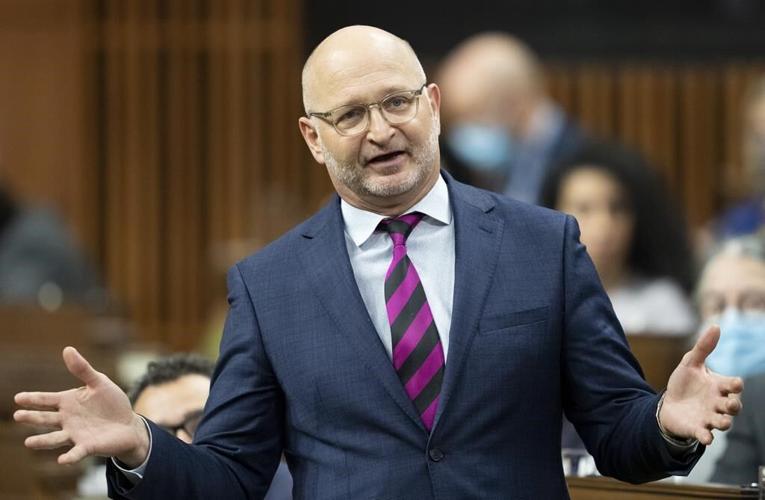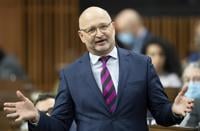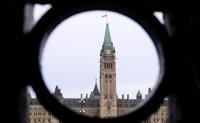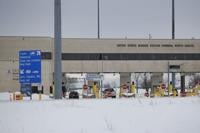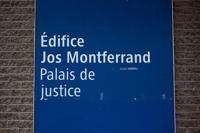OTTAWA - Justice Minister David Lametti repeatedly invoked solicitor-client privilege in his testimony at a public inquiry on Wednesday, declining to answer the critical question of what legal advice the federal Liberals relied on to invoke the Emergencies Act last winter.
He was one of three ministers to testify in one day at the Public Order Emergencies Commission, which is probing the decision to use of emergency powers in response to the weeks-long protests against COVID-19 restrictions and the Liberal government in downtown Ottawa and at several border crossings.
Lametti confirmed to the commission that he raised the idea of using the extraordinary legislation just a day after the official start of the "Freedom Convoy" demonstration Jan. 29.
Text messages tabled as evidence at the inquiry show Lametti texted his chief of staff about the Emergencies Act, which had not been used since it became law in 1988, on Jan. 30 — more than two weeks before the federal government would ultimately move to invoke it.
If the government decided the act was needed, there would be discussion about whether legal standards had been met, Lametti said, and he wanted his department to be prepared.
"The worst scenario would be something explodes, and we are not ready to use it because we haven't done the kinds of consultations necessary, or asked the appropriate questions to the appropriate people in order to get it done. So this is me being prudent."
The inquiry also heard that in text messages to the public safety minister, Lametti mused early in the crisis about a role for the military and dismissed former Ottawa police chief Peter Sloly as "incompetent" for his handling of the situation — an expression of how "frustrated" he was at the time, he told the commission.
But even as Lametti detailed his early response to the protests, he would not explain the process by which he and other Liberal ministers made a final decision on the act.
Government lawyer Andrea Gonsalves said before Lametti's testimony that the government would not waive solicitor-client privilege, which protects legal advice from being publicly revealed.
Lametti, who as Canada's attorney general is the government's top legal adviser, explained it is up to the governor-in-council to waive privilege, but added: "I would, in probably virtually all cases, advise that it shouldn't be waived, simply because it is such an important fundamental principle."
Commission lawyer Gordon Cameron said Lametti's inability to detail the legal grounds on which the government declared a national emergency creates a "conundrum."
"We have throughout, from the beginning of this proceeding through to now, attempted to find a way to lift the veil that has made such a black box of what has turned out to be a central issue," Cameron said.
"We just regret that it ends up being an absence of transparency on the part of the government in this proceeding."
In a statement, the Canadian Civil Liberties Association, which is also a party to the inquiry, said the government can choose to waive privilege and "should do so in the exceptional circumstances here."
The Emergencies Act identifies a public order emergency as a threat to Canada's security, as defined in the Canadian Security Intelligence Service Act.
That definition includes espionage or sabotage of Canada's interests, foreign influence, acts of serious violence against people or property with political, religious or ideological objectives, or the violent overthrow of the Canadian government.
Canadian Security Intelligence Service director David Vigneault testified on Monday that while no such threat materialized during the protests, he told the prime minister he supported the decision to invoke the Emergencies Act.
Vigneault said he was satisfied that a threat to national security had to be interpreted differently in the context of the Emergencies Act after he received advice from the Department of Justice.
For his part, Lametti said it was up to cabinet — not CSIS — to decide whether the threshold was met. "There are other inputs that can go into the meeting of that definitional standard that CSIS wouldn't normally use."
Private text message conversations between Lametti and fellow Liberals were submitted into evidence Wednesday, including his Feb. 2 exchange with Public Safety Minister Marco Mendicino.
"You need to get the police to move," Lametti wrote. "And the (Canadian Armed Forces) if necessary. Too many people are being seriously adversely impacted by what is an occupation. I am getting out as soon as I can."
He told Mendicino that people were looking to them for leadership — "and not stupid people."
Mendicino responded: "How many tanks are you asking for?" Lametti replied, "I reckon one will do."
Lametti told the inquiry that the message was a joke, and the military was never considered a real option during the protests.
Testifying later Wednesday, Defence Minister Anita Anand underscored that it's not the role of the Armed Forces to get involved in demonstrations because bringing them in only risks further escalation — and besides, the Forces are not trained in protest management.
"Our country's soldiers are not police officers," she said, adding that the military is legally bound to be a force of "last resort," to be used only "in the most dire circumstances."
Anand and Transport Minister Omar Alghabra, who rounded out the day's testimony, both said they supported the use of the Emergencies Act.
A few days before its invocation, Alghabra said he spoke with U.S. Transportation Secretary Pete Buttigieg about the blockade of the Ambassador Bridge in Windsor, Ont., which the minister said handles some $400 million in trade every day.
"We are running out of patience," Alghabra said in the call, according to a government document. "If things aren't addressed in the very near term, we as the federal government will step in."
Alghabra said his intention was to give Buttigieg "a sense of confidence that this is a priority for us."
The inquiry has heard of other entreaties from U.S. officials at around that time, and the federal government cited threats to the economy as part of its justification to invoke the act.
The commission's six weeks of hearings are expected to conclude with Prime Minister Justin Trudeau's testimony on Friday, with a final report due early next year.
This report by Ďă¸ŰÁůşĎ˛ĘąŇĹĆ×ĘÁĎ was first published Nov. 23, 2022.

